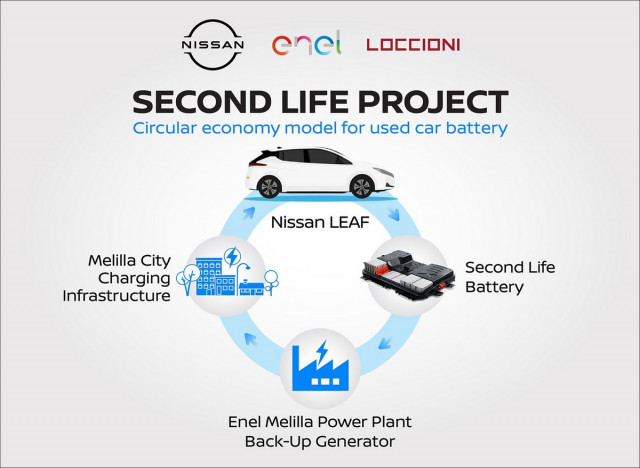At a conventional power plant in Melilla, Spain, Nissan and Enel are launching an innovative second-life energy storage project, which is employing used EV batteries to enhance grid stability and help meet the needs of an isolated power network.
As part of the collaboration, Nissan has provided the batteries from its EVs and Loccioni, a system integrator, secured the proper integration between batteries needed for the circular process. The project leverages the principles of circular economy, wherein once the battery within an electric vehicle has come to an end of its life cycle, they are recycled and assembled into a large stationary storage system.
The system is integrated with the Melilla facility, run by Enel Group's Spanish subsidiary Endesa, to avoid the interruption of electricity supply during events of excessive load. This improves the reliability of the grid and secure the continuity of network service to the local population.
The back-up generator is composed of 48 used Nissan LEAF batteries and 30 new ones. Ensuring vehicle batteries remain sustainable continues to be a priority for Nissan, the company has said.
Soufiane Elkhomri, Director of Energy Services for the Nissan AMIEO region (Africa, Middle-East, India, Europe and Oceania), explains, "At Nissan we believe the future is electrified. Through partnerships, we can make the future smarter and more efficient. The collaboration with Enel allowed us to create a model for a battery's second life, which can be applied in many other use cases. This is a great example of the endless possibilities that come with reusing electric vehicle batteries as part of a circular economy".
Salvatore Bernabei, CEO of Enel Green Power, said, "The development of storage technology is key if we want to foster greater renewable penetration in our energy systems, so we can truly shape the power generation of the future".
"Furthermore, in the Enel Group, we are strongly committed to using technology that complies with the principles of sustainability and circularity. Specifically, this project demonstrates that, in line with the Open Innovation principles, we can find solutions for the management of the end of life of essential equipment such as batteries, a topic which is at the core of the sustainable energy issue", he added.
Used Nissan EV batteries provide a source of energy when they are interconnected and stored at the facility with a power of 4 MW. The system has the ability to produce up to 1.7 MWh of energy should the power plant be disconnected from the system, the storage facility can inject energy into Melilla's electricity grid for 15 minutes, which is enough time to reset the system and restart the power supply.
Read More

